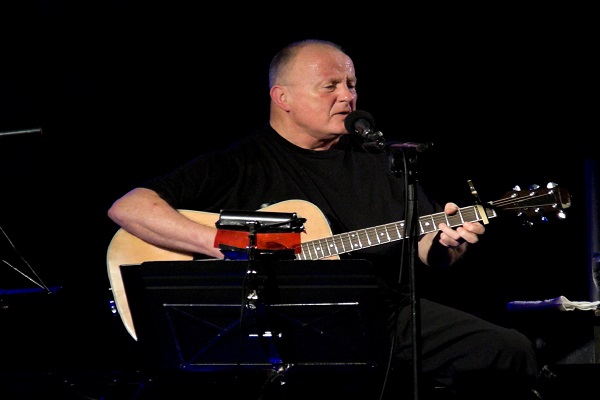
![]()
Christy Moore - A Terrible Beauty
Reviewed by Eoin Glackin
Here we are, living amid the "terrible beauty" that Yeats heralded at the dawn of this nation back in 1916, and the great Christy Moore wants to check back in with it all.
Christy has always seen Irish art and culture as living things - never fixed or stagnant, ever evolving around us and within us. There are always new stories to add with the old, new stitches for the tapestry. Here, Christy has handpicked songs from various writers, including himself, that all weave together seamlessly, ultimately adding to the beautiful grand narrative of Irish music and folklore.
Production is gentle and sparse with Christy’s voice and words rightfully front and centre. At times, atmospheric sound-beds wrap around his already warm and deep vocals, but nothing is ever over-bearing or out of place. Less is... Moore (sorry!).
I hear a strong theme of innocence and indeed, innocence lost, running through these songs.
Opener “Boy in the Wild,” mostly written by the late Wally Page with additional writing by Moore, sets a tone that carries through as he tells the child in question:
“Mind how you go, take heed who you follow…
Lift up your heart, lean on your dad when you’re not strong enough”
This idea of heeding who you follow trickles through several stories on the record, as toxic forces working against the good and innocent of this land are faced head on.
“Sunflower” pays tribute to war torn Ukraine and feeds a notion that despite the many Ukrainians tragically and needlessly slaughtered by Putin, the country and its sunflowers will defiantly remain.
The work of Dublin band A Lazarous Soul, the vehicle of songwriter/lyricist Brian Brannigan, has clearly had an impact on Christy, who recalls being floored by them live one night in Whelans.
He sings two songs from the bands 2019 album “The D They Put Between the R & L” here, “Black and Amber” and “Lemon Sevens.” The first, told from the point of view of a child left to watch their father fill himself with pints down the local pub, knowing that violence was soon to follow.
While "Lemon Sevens" carries on the theme of innocence lost as it chronicles a woman, cast from society, spiralling in the pits of despair and turning to hard drugs. All while somewhere a child is left “whimpering for Ma to come and help.”
Moore said of Lemon Sevens: “It’s a classic ballad, it’s a big song….in my repertoire it sits beside ‘The Well Below the Valley,’ ‘Little Musgrave’ and ‘Gortatagort’… one of the very best of songs…this song will live on.”
"Cumann naMná" is classic Christy, drawing on humour and wit to point out hypocrisy. He lambasts Sky News presenter Rob Wotton for asking Ireland football player Chloe Mustaki if her team needed to be “educated” after their post-match rendition of The Wolfe Tones' "Celtic Symphony" went viral.
Ann Lovett has appeared in Moore’s work before, notably on his self-penned “Tyrone Boys.” He remembers the 15-year-old schoolgirl, who tragically died alone while giving birth, once more here on “Life and Soul.” He uses words spoken anonymously at an event in her honour to give us insight into who she was as a human being, before she and her baby son died in that grotto 40 years ago. Christy is adamant that Ann’s story, and the light it shone on a dark corner of Irish society, never be forgotten.
This leads us to “Lyra McKee,” the tale of another innocent, decent soul killed by the remnants of a time that most had hoped was gone forever. Songwriter James Cramer penned this powerful ode to the fearless journalist and Christy delivers it with solemn passion. The thread Moore weaves between the Ukrainian woman who “confronted soldiers on her street” in “Sunflower” and the bravery of Lyra throughout her career up to the moments before her death, is hard to miss.
He continues to draw attention to parts of our history that he hopes won’t be forgotten on “Darkness Before Dawn,” written by Naas man Pete Kavanagh. Christy said the song “describes a reckless and subsequently disastrous IRA raid on the NAAFI store in my home town of Newbridge… It would have been a justifiable raid on the English Army of occupation had there not been an innocent civilian family asleep upstairs.”
We find a distant cousin to Christy’s classic “Lisdoonvarna” on “The Big Marquee,” as he recounts a slice of life on the gigging circuit.
His haunting rendition of Jim Page’s “Palestine” reminds us that Moore’s allegiance has and will always be with the occupied, never the occupier. There is another implicit thread between the story of Lyra McKee and that of Palestine, as we have seen a staggering number of journalists murdered there by the IDF in the course of their reporting.
As our new wave of so-called patriots bizarrely accuse Moore of suddenly turning “woke,” like they’ve never actually paid attention to the man and his work, recordings like this show us that he has never changed, and never will.
In fact, on the album closer “Snowflakes,” written by housing activist and musician Martin Leahy, he calls out those very people. The acapella piece gives two fingers to these often-anonymous, self-styled patriots who claim to speak for some silent majority of Irish people who they believe are as vapid and bigoted as them.
Christy Moore has never claimed to represent anyone but himself, but on this album as throughout his career, I am happy to declare that Christy speaks for me, and long may he continue.
4/5